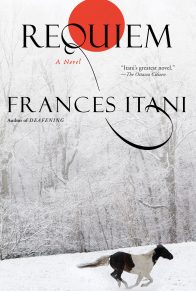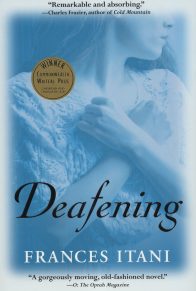Georgie’s suitcase is closed and locked, nothing valuable in the outer, zipped pockets, she’s been warned. If you put locks on the outside, they’ll be cut off in the name of security. That’s what airport workers are entitled to do. They think nothing of hacking through the arm of a lock, or wrenching the tab off a zipper. You’re better to keep every one of your belongings tucked deep inside your luggage. If you must stick something in the pockets, let it be a magazine, a pouch for dirty laundry, nothing more. Her daughter Case, frequent traveller, has given her a thorough briefing. So much briefing, Georgie feels stuffed with information. You’d think Case was the mother and she the child. But it’s nothing more than Case’s penchant to take charge, to direct; Georgie knows this as well as she knows the width of her own palm, the hinges of her own bones. Case owns a theatre, and she directs. That’s what she knows how to do.
Georgie did pay attention to Case, but she doesn’t pretend that she isn’t nervous. She has flown only a few times and never by herself. Her first flight was when she and Harry took their Big Trip to Europe the year he retired. The following year, they flew to Seattle. They capitalized the words Big Trip in conversation because it had taken them a lifetime to save. It was easy to speak in capitals, one of the asides of a long marriage. She misses those small comforts—an eyebrow lowered, a tilt of the head. She misses his warm body next to hers in bed. But Harry is dead, has been dead for more than three years, and this is not the time to dip into loneliness and grief. She’s facing a two-hour drive to the city airport, where she’ll leave her car in the car park. She has already turned down Case’s offer to drive her, knowing that Case is in the midst of rehearsals. And Georgie does not want anyone hovering. Haven’t the Danforth women always been independent? She is on her way to Buckingham Palace, and she has decided to travel alone. The invitation allows One spouse or One companion, but whom does one bring to meet the Queen? Not her mother, Philomena, who lives at the Haven and is a hundred and three. Not her sister, who lives in Florida, though Georgie wonders if perhaps she should have invited Ally, after all. She misses her sister; hasn’t seen her since Harry’s funeral.
Too late to ask anyone now. And Georgie is the one who was born the same day as the Queen, April 21, 1926. Hasn’t she always known she has a special shared birthday? Doesn’t the invitation make that perfectly clear?
She turns out the lights and stands in shadows in her kitchen. Afternoon sun spills its warmth into her backyard and highlights the budding trees that edge the side of the ravine. Snow is gone; a crocus pushes through earth here and there. An unusually mild twenty-three degrees outside and good weather for flying, at least at the starting end. She has scattered peanuts for the jays and filled the feeders with sunflower seed and niger. She has watered her indoor ivies and the big jade, and checked the windows and doors. She’ll be away ten days. There’s bread in the freezer, butter in the butter dish, a tightly wrapped package of cheddar and two orange tomatoes. Enough for a sandwich when she gets back. She likes to plan; she won’t have to shop immediately when she returns. She stares into the branches of the chokecherry tree at the back window. And with the lights out, catches a glimpse of her own reflection.
She’s wearing her Austrian wool cardigan beneath a matching spring coat. Both are a soft, mossy green. Slacks, so she’ll be comfortable on the plane overnight. Sensible shoes—doesn’t want swollen feet in the morning. If she were to pick up the phone here in Ontario, England would be five hours ahead. By the time she gets there tomorrow, it will be more hours than that. Twenty maybe. And then subtract five. Who cares? She can’t stop to figure it out. It’s enough to know that she’ll have to try to sleep on a plane that has been designed to fly the width of the Atlantic, west to east, and touch down on the outskirts of London in the early morning.
Hector Protector was dressed all in greenHector Protector was sent to the queen
Shouldn’t she gather up her things, walk out the front door, come back in, sit for a moment and then depart a second time? It’s what characters in Russian novels do—to ward off ill fortune, to ensure a safe journey. But no, she has to get moving.
Case was at the house an hour ago to say goodbye. She gave her mother a hug and left a small gift bag stuffed with orange paper on the passenger seat of Georgie’s car. “Don’t look until you’re in the air,” she called back from the driveway. “You can carry it as hand luggage. See? It’s not so big. Wait until you’re over the ocean before you look inside.” Then Case jumped into her own car and drove down the hill and into town, for rehearsal.
Georgie wonders if Harry, given his history—and if he were alive, which he isn’t—would have agreed to accompany her on this trip. Didn’t he refuse to include England when they planned their Big Trip? She missed Buckingham Palace then, and didn’t complain. Now she has a second chance. The invitation from the Queen is tucked inside her new black purse, along with the P. D. James paperback she’ll read in the airport. Everything is new, the purse with the leather shoulder strap that will leave her hands free to hand over her passport, to exchange currency, to hail a London cab. The blue dress is new; she drove to the city to find it—a two-hour trip like the one she is facing today. The dress is made of luxurious silk, round neck, pearl buttons on the cuffs, and is wrapped in folds of tissue paper, the last item to be packed. Her pearl necklace is not new but is in its case in the purse because it can’t be trusted to airport security. Harry designed the necklace and strung the pearls himself, each and every pearl secured with a double knot. A long time ago.
What if the toe of her shoe gets caught in a palace rug and she falls flat on her face before the Queen? Will Charles be there and quickly grab her arm? Will Philip speak to her? Will she remember what to do? Will she have a chance to return to see the famous art collection? What if? What if? She checks one more time for tickets, pearls, sheets of protocol, which she’ll review on the plane after she orders a glass of champagne. What an adventure! The invitation is there, too:
The Master of the Household has received Her Majesty’s command to invite Mrs. Georgina Danforth Witley to a Lunch to mark the 80th Birthday of The Queen.
Ninety-nine men and women received the invitation, in all parts of Elizabeth’s kingdom, every one born the same day. Georgie has been commanded to arrive between 12:30 and 1:00 p.m., Wednesday the 19th, because the event will be held two days before their actual birthday. She is allowing herself several days in London to recover from jet lag and do a little sightseeing before going to the palace. She wants to be rested, calm. She’ll have five full days after the celebration, and will fly home the 25th. She wants to walk the streets of the ancient city and visit places she has read about all her life. She wants to sit tall in a London cab and drive past sites she has known only from photographs and her imagination: Marble Arch, Piccadilly, Downing Street, Big Ben. She’ll walk through the Abbey and remember stories of kings and queens, explorers and poets. She’ll run her hands over the bones or memorials of Handel and Hardy, Browning and Chaucer, the Bront’s and Shakespeare. Her footsteps will echo over old stone. She’ll have tea at Fortnum & Mason’s and visit the Victoria and Albert Museum, the National Portrait Gallery, Dickens’ house and the Tate. She’ll buy a scarf of Liberty silk and she’ll try to get a ticket for a play, and she’ll run out of energy before she’ll run out of things to do.
Georgie picks up her keys and passes the mahogany cabinet with the glass doors where she has stored the memorabilia she has collected from the time Elizabeth was a young princess painted by de László. In Georgie’s miniature copy, the princess is holding a basket of flowers and wears a full, pale dress with a blue satin sash. Her hair is waved and tinted with gold, and the bones of her fingers are delicate and slender. There are also programs, postcards, Maclean’s 1937 special Abdication issue—five cents a copy—which includes the “Message of Abdication” from King Edward VIII, and all of the speeches and proclamations that followed and broke so many hearts. There are maps of Royal visits, a Coronation matchbook stamped Elizabeth R 1953, and The Princess Elizabeth Gift Book, which finally became Georgie’s when Ally and her husband, Trick, packed up and moved to Boca Raton. It’s all there. It’s all there in Georgie’s collection. Even a Royal scrapbook from the forties, which Case found in an antique store in the city. Case teases Georgie about her collection, but that didn’t stop her from making a contribution.
Georgie does not go out the door and come back inside to sit for a moment, the way the Russians do. They’re so excitable, she thinks. They never stop talking, even when they do come back in and sit down. She hoists her suitcase into the trunk of the car, says a silent thanks that she’s still fit enough to hoist things at all, climbs into the driver’s seat and spots Case’s gift on the seat beside her. She presses on the bag with two fingers and sees that it’s something soft. She backs out—there are only four houses at the top of the ravine, so it’s always quiet on her street—and heads the half-mile down the hill where she’ll join the highway that leads out of town. As she rounds the first curve, she checks her wrist to be certain she hasn’t forgotten her watch, the one with the wide gold strap. Because her attention is on her wrist, she allows the steering wheel to twist slightly to the right. In a split second, the right front wheel slips off the pavement. The moment the tire catches a depression in the shoulder, the entire car gives a jolt, and Georgie’s hands clamp back onto the steering wheel.
But the car, with a mind of its own now, refuses to continue the curve. It has already nosed itself between a pair of striped railings that have been spaced to prevent this very thing from happening. The railings are meant to give warning, deflect danger, to keep wheels on pavement where they are absolutely supposed to be. But Georgie’s car has neatly fit between end-posts, and now it is falling through space, silently at first, so that the event unfolds as if it is not to be believed. The car lands in the top branches of a large tree and then flips, and flips again, and brushes past another tree, and down and down.
Georgie has not cried out. Her mouth is open and then her teeth clench, and she holds tight even knowing that she cannot steer through air. Just as the car does its first somersault, her mind perceives the word tree. She has fallen sideways, but her eyes are open and her pupils dilate as if they are watching a slow-moving picture in which millions of dots have gathered for the sole purpose of shaping and reshaping themselves. Hundreds and thousands of leaves assemble and float by, the veins in each separate and distinct. An image drifts through memory, a long-ago childhood image of a glass-leafed ornament on an oak table. Tiny leaves, faceted and smooth, attach to filaments of copper wire. Miniature branches of threaded silk reach out, pale and soft as moss. A slender trunk nestles to a glass base and fits the curve of Georgie’s palm.
She dares not look down because a tree is rising beside her now, full and dense, a living, breathing tree. Her fingertips reach to touch and, even as this happens, she feels a sharp yank on her body. As she is being pulled towards an opening of light, she hears an explosion of laughter, her own.
“I could become the tree,” she says and, improbably, she laughs again. Once more, she extends her fingertips, this time to feel the roughness of bark. Tendons are taut along her wrists and hands. Her car is nowhere to be seen. Why is she separate from her car? Something orange, a clot in the eye, rolls past and drops out of sight. But Georgie is still moving. And now, for reasons she cannot explain, she is stretched out on her back. Roots grow savagely from the earth and slam her ribs. Her scapula is stabbed by a lightning edge of rock. Root or rock, her flight has ended. Georgie has sunk to the bottom of Spinney’s Ravine.













